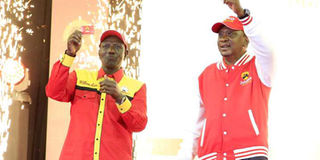Fear of electorate marks beginning of war against corruption

Deputy President William Ruto (left) and President Uhuru Kenyatta at Safaricom Indoor Arena in Nairobi on January 13, 2017. PHOTO | JEFF ANGOTE | NATION MEDIA GROUP
What you need to know:
Given the deep schisms in our society, it is crucial that our politicians get used to being kicked out of power after one term.
If they learn to fear the electorate, and understand that support is not to be taken for granted, maybe we will have more success in this war against corruption, reduce tribalism and exclusion, and begin the process of real development rather than have economic growth that creates joblessness.
Barely six months ago, Jubilee seemed almost certain to prevail at the next polls, with or without rigging. But after an avalanche of events, Jubilee now appears all scared and worried.
What changed in the last six months to cause Jubilee to forcefully pass unilateral amendments to a negotiated law in a way that deliberately increased tensions? Why did Jubilee start a campaign based on falsehoods against the international group, IFES, and return to attacking strong and independent civil society organisations, while decrying civic education for voters? Why has mass voter registration become a pretext for early and illegal campaigns complete with derogatory and scare-mongering social media attacks?
And what has made the IEBC to revert to the dreaded green and black voter register books, as their only backup to the BVR registration system? With these green and black books, we can predict that on August 8, the electronic voter identification kits will fail and verification of voters will be purely on the basis of the manual registers, allowing for the resurrection of dead and ghost voters!
So what went wrong? First, there was the flow of news of massive grand looting that never seems to end. There was the NYS scandal that is much bigger than it initially seemed, catching more people in its net as parliamentary hearings proceeded. The incompetence, slowness and absurd decisions of the Anti-Corruption Commission in clearing some people in unclear circumstances only added to the gravity of the scandals and exposed the lie in Jubilee’s war against corruption. The vast sums of money that were bandied around, literally in bags, only made things worse.
ACCOUNTED FOR
Then there is the unresolved Eurobond issue where billions of shillings cannot be accounted for. Some pundits are so eager for this matter to go away that they ignore the fact that the Treasury redacted important information about where money was sent, and present the US Federal Reserve Bank, as well as international banks as impeachable. Finding it impossible to rebut David Ndii’s points, they resort to generalisations and character assassination. Still, the issue refuses to go away.
Second, the last six months saw the emergence of the National Super Alliance (Nasa) idea, with impeccable timing given the frustrations and despair. The idea that the Opposition could unite captured the imagination and created a narrative that it was possible to beat Jubilee in fair and credible elections. It almost doesn’t matter who between Raila Odinga, Musalia Mudavadi and Kalonzo Musyoka is eventually selected the candidate to carry the torch for Nasa. It already seems way more inclusive than Jubilee.
So much so that the rhetoric of “40 versus 2” from Jubilee circles has returned, exposing just how exclusive Jubilee is. Incidentally, even though the 2002 election was basically “41 versus 1” with the Narc machine, that has never been a problem!
IRREDUCIBLE AGENDA
Nasa has some challenges to overcome to fulfill its potential, including agreeing on a common irreducible agenda, including a plan on combating the runaway looting, and coming up with a transparent formula of power-sharing that fosters unity without compromising Kenyans’ expectations.
Any democrat, even if the most ardent Jubilee supporter should see the benefit of a strong opposition especially during elections. In a divided society, one way to reduce complacency, balance development and promote inclusion, is a strong opposition. We have already seen Jubilee trying to demonstrate its inclusiveness and balance on development and public appointments.
A key marker of a democracy is power changing from one party to another. We have had only one such change in Kenya, in 2002. In 2013, the entire state apparatus was put at the disposal of Jubilee – to maintain the status quo – no matter that Raila Odinga was nominally Prime Minister.
Given the deep schisms in our society, it is crucial that our politicians get used to being kicked out of power after one term. If they learn to fear the electorate, and understand that support is not to be taken for granted, maybe we will have more success in this war against corruption, reduce tribalism and exclusion, and begin the process of real development rather than have economic growth that creates joblessness.





